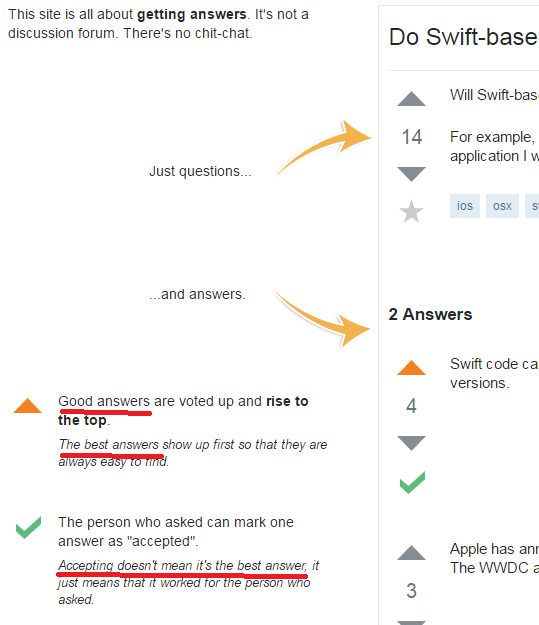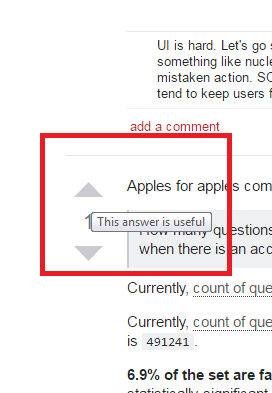Accepted answers are pinned to the top of the list of answers, even when the accepted answer is outvoted by other answers (unless it was a self-answer). I am requesting that we stop pinning the accepted answer to the top and just allow it to be in its natural sort order position.
My request basically echoes what Brad Larson has said before:
By default, we should sort accepted answers by votes alone. We can make the accept vote be treated as an additional vote as a tiebreaker, but I don't think that the person asking the question should have a super vote that outweighs the rest of the community.
Past Support
In 2015 (votes: +100 / -8):
In 2014 (votes: +57 / -7):
Deemphasise the accept mark if there's an answer the community strongly prefers? (similar but slightly different question)
In 2013 (votes: +91 / -9):
Can we exempt downvoted accepted answers from getting the top spot?
Shog9's 2013 analysis of the problem is worth the read, but even this analysis seems to suggest that a future reevaluation could be considered. I'm hoping that 2016 will be the year.
The argument for unpinning
The best answers can rise to the top.
The Stack Overflow tour says:
Good answers are voted up and rise to the top. The best answers show up first so that they are always easy to find. The person who asked can mark one answer as "accepted". Accepting doesn't mean it's the best answer, it just means that it worked for the person who asked.
(emphasis added)
Stack Overflow assumes (correctly in the majority of cases, I believe) that the top voted answers are the best answers. Artificially pinning an outvoted accepted answer to the top makes the bolded phrases above self-contradictory.
Consistency with self-answers
Self answers are currently sorted in the way that I am requesting all answers be sorted. Here is an example of one of my self-answered questions. My answer worked for me so I accepted it and I'm not going to change the accept. However, other people have found another answer more helpful. Now that answer has the top position. That's the way it should be.
Allows incorrect and obsolete answers to fade away
Sometimes incorrect answers get accepted for some reason (example). Other times the accepted answer may have been correct in the past but become obsolete (example). The original poster may no longer be around (or care enough) to change the accepted answer. Unpinning the accepted answer would alleviate this problem.
The argument against unpinning
I've seen very little in the way of a solid argument for keeping accepted answers pinned to the top, but here are a few reasons that have been thrown out.
The accepted answer actually works for one person
But the Stack Overflow answers are not ultimately there for that one person. They are there for the countless visitors who come later. Ninety-nine percent of the time that I upvote a non-accepted answer, I am also signifying that it solved my problem or at least helped me get one step closer to solving it.
The accepted answer is tested (*)
It is true that many people will upvote answers without testing them. However, if a highly voted answer contains a mistake, it will start collecting comments saying so. If that mistake is not corrected, other people start adding answers that are correct. The voting system starts moving those correct answers to the top. This seems fair to me.
The accepted answer solves the actual problem described in the question (*)
Fine, but when I use Stack Overflow I don't care if my problem is exactly the same in every detail as the OP. Sometimes the OP uses a title that leads search engines and thousands of future visitors to expect a different answer than the one that solved the OP's problem (example). There is no need to keep those kind of answers on top anymore. If I want to find them I can scroll down.
Added complexity with other solutions (*)
True, some proposed solutions may add complexity, like adding a threshold (<= 2nd answer - 10), or only answers with negative votes, or unpinning after 90 days, etc. However, I am proposing that the accepted answers are sorted just like every answer, just like self-accepted answers already are. If anything, this reduces complexity.
The checkmark belongs to the OP (*)
Let the OP keep it. I'm not suggesting that we change the accepted answer or how the accepted answer looks. Only where it is located.
Users might think there is no accepted answer (*)
Ok, but there are already lots of questions that don't have an accepted answer. I just go with the top voted answers in that case. It works pretty well.
Conclusion
Is there a strong argument against unpinning the accepted answer from the top that I am missing? If not, I hope that the Stack Overflow team will reconsider this issue.




